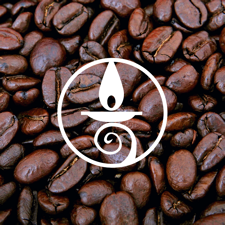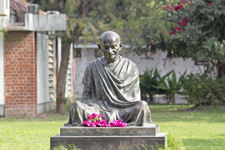From Your Minister
October 1, 2019Podcast: Download (Duration: 6:20 — 5.8MB)
Subscribe: More
The roots of violence: Wealth without work, pleasure without conscience, knowledge without character, commerce without morality, science without humanity, worship without sacrifice, politics without principles.
This Gandhi quote has haunted me for years, as I’ve wondered: What does it mean to worship with or without sacrifice? Does Unitarian Universalism call for sacrifice? Is it a root of violence if we do not participate in sacrifice?
So, seeking wisdom on the matter, I tried an experiment. First I went to my personal Facebook page, and I asked my wide assortment of associates (the word friends being highly overused)—What is the biggest sacrifice you’ve ever made? Overwhelmingly, the responses were about having or not having children, doing or not doing things because of the needs of a spouse or family member, paths taken and not taken  for reasons other than personal choice. No one mentioned religion of any kind, including Unitarian Universalism, as a source of sacrifice.
for reasons other than personal choice. No one mentioned religion of any kind, including Unitarian Universalism, as a source of sacrifice.
Then I went on the “CLF Coffee Hour” Facebook page, where discussions flow on all kinds of topics, and asked, What’s the biggest sacrifice you’ve ever made? What motivated you to make it? Do you think Unitarian Universalism demands any kind of sacrifice?
There the conversation got very interesting! Here are some of the things people shared:
- Those of us who came to UU from authoritarian churches had to sacrifice certainty. No longer do we have someone to tell us what we need to believe and constantly reassure us that our doctrines are correct. But when we let go of certainty we open ourselves to seek and find wisdom and inspiration in those traditions we had dismissed as false. So the sacrifice becomes gain rather than loss.
- I feel like UUism has encouraged me to sacrifice easy answers, superficial comfort, and ingrained prejudices. (I don’t know if it has required that of me, but without it, I’m not sure I’m striving towards the principles.) It’s hard work, all this thinking and questioning!
- I would say that UUism has drawn me out of my comfort zone and has caused me to look at the bigger picture and realize that we’ve got to be out in the world to fight for social justice, interact with people and learn new ideas. It is scary at times, since I suffer from panic and anxiety and being gay in a hostile world, but I’m determined to help make a difference.
- When I was young, people told me I had to make sacrifices to achieve success in my life. So I made all the sacrifices, but didn’t get the success I was promised. So now I am very skeptical of anyone who asks me to make a sacrifice.
- We are continually “giving up” something for something else. … sometimes it’s giving up needed change to preserve our ego or comfort. Sometimes it’s giving up our comfort to bring about needed change.
That’s just a sample, and the diversity of responses is compelling, but no one answered “No. UUism does not make me sacrifice anything,” though one person, as you see above, voiced skepticism about being asked to sacrifice after having made futile sacrifices in the past.
As for me, I’m still mulling it about. It’s always easy to compare what I do with what other people do and come up feeling that I have made no sacrifices in my life, or to compare myself with others and believe that I have. But I don’t think sacrifice is a competitive sport. And what sacrifice means is subjective. Over and over, when I exclaim about what I perceive as a huge sacrifice someone else has made, I’m told that for them it doesn’t feel like a sacrifice at all!
When I was a UU kid and the Catholic kids I knew were giving up something for Lent—usually candy—I know that some part of me wanted to join them, despite my love for candy. When my own child grew up with Muslim friends and learned they were fasting for Ramadan, there was an immediate impulse to fast with them, to join them. I think that sacrificing in solidarity—not competitively, not to one-up someone else’s sacrifice or to have sacrifice bragging rights—can be immensely satisfying. Whereas sacrificing when others are not can be immensely infuriating.
 I still wonder what Gandhi specifically meant—he who lived in poverty when he could have been rich, who gave his very life for the freedom of his people. I’m pretty sure that our UU religion does call us to some kinds of sacrifice—giving up certainty, giving up easy answers, giving up the comfort of old assumptions and prejudices that do harm to others. And it also calls us to work against the ways that our society seems all too willing to sacrifice the needs of some people in exchange for the comfort of others. I don’t know whether that counts as worship without sacrifice or not, but I’m willing to live inside of that complexity
I still wonder what Gandhi specifically meant—he who lived in poverty when he could have been rich, who gave his very life for the freedom of his people. I’m pretty sure that our UU religion does call us to some kinds of sacrifice—giving up certainty, giving up easy answers, giving up the comfort of old assumptions and prejudices that do harm to others. And it also calls us to work against the ways that our society seems all too willing to sacrifice the needs of some people in exchange for the comfort of others. I don’t know whether that counts as worship without sacrifice or not, but I’m willing to live inside of that complexity
- From Your Minister - July 1, 2020
- From Your Minister - June 1, 2020
- From Your Minister - May 1, 2020
Quest Monthly Print Edition
Recent Issues
Latest Spiritual Reflection Posts
Weekly Newsletter
About
Quest for Meaning is a program of the Church of the Larger Fellowship (CLF).
As a Unitarian Universalist congregation with no geographical boundary, the CLF creates global spiritual community, rooted in profound love, which cultivates wonder, imagination, and the courage to act.
Contact
Church of the Larger Fellowship Unitarian Universalist (CLFUU)
24 Farnsworth Street
Boston MA 02210

